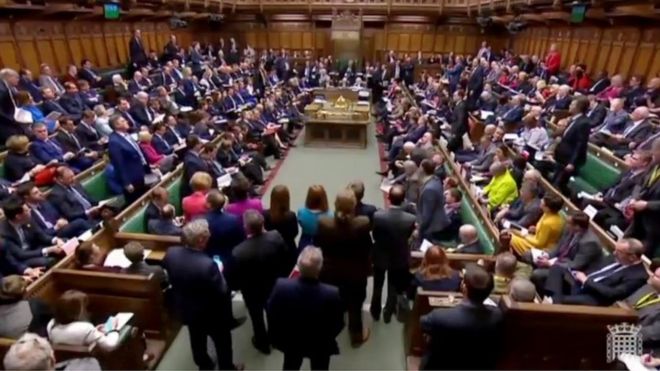MPs will vote on the withdrawal agreement, which sets out the terms of the UK’s departure from the EU.
Ministers say their backing is vital if Britain is to avoid a disorderly exit.
But Labour will vote against it, saying that denying MPs a say on the political declaration section of the deal, which outlines the shape of future UK-EU relations, is a “blindfold Brexit”.
Friday’s vote will not allow Parliament to ratify the entire withdrawal package, because the law allows this only after the passage of a “meaningful vote” on both parts of the deal.
The prime minister has already lost two such votes on the full deal by large margins, and Commons Speaker John Bercow had ruled out bringing the same motion back a third time without “substantial” changes.
However, the government says a vote on the withdrawal deal alone will be enough to meet the criteria laid down by EU leaders for the postponement of Brexit from 29 March to 22 May.
With Labour and the DUP planning to vote against it, the BBC’s political editor Laura Kuenssberg said it looked like the prime minister was heading for another loss on Friday.
Defence Minister Tobias Ellwood told BBC Newsnight: “There are some big challenges here.
“It’s a key day and probably the last opportunity to get this particular motion across.”
If the government is defeated, ministers will have until 12 April – the date by which the UK would have to indicate whether it would stand candidates in the 2019 European Parliament elections – to get the deal through or “indicate a way forward”.The vote, on what was meant to be Brexit Day, is a request to MPs to allow her to keep going, to carry on pursuing her route, with its well-documented flaws.
There’s a challenge there too, not just to her own Brexiteers but to Labour and the other opposition parties, to say “no” to a long delay to our departure from the EU, the last moment when Number 10 believes anything even approaching a timely exit can be guaranteed.
There are signs now of course that many Eurosceptic MPs are ready to say yes – not because they suddenly have realised her deal is perfect but because more of them officially realise that it is the clearest break from the EU they can realistically hope for.
Yet her Northern Irish allies are not persuaded. Labour, even though they have sometimes accepted that what’s on the table tomorrow, the divorce deal, will never be unpicked by the EU, will still, in the main, resist.
